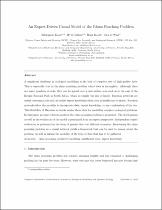JavaScript is disabled for your browser. Some features of this site may not work without it.
- ResearchSpace
- →
- Research Publications/Outputs
- →
- Journal Articles
- →
- View Item
| dc.contributor.author |
Koen, Hildegarde

|
|
| dc.contributor.author |
De Villiers, Johan P

|
|
| dc.contributor.author |
Roodt, H

|
|
| dc.contributor.author |
De Waal, A

|
|
| dc.date.accessioned | 2017-06-07T06:10:00Z | |
| dc.date.available | 2017-06-07T06:10:00Z | |
| dc.date.issued | 2017-03 | |
| dc.identifier.citation | Koen, H., De Villiers, J.P., Roodt, H. et al. 2017. An expert-driven causal model of the Rhino poaching problem. Ecological Modelling, vol. 347(10): 29-39. https://doi.org/10.1016/j.ecolmodel.2016.12.007 | en_US |
| dc.identifier.issn | 0304-3800 | |
| dc.identifier.uri | http://www.sciencedirect.com/science/article/pii/S0304380016307621 | |
| dc.identifier.uri | https://doi.org/10.1016/j.ecolmodel.2016.12.007 | |
| dc.identifier.uri | http://hdl.handle.net/10204/9115 | |
| dc.description | Copyright: 2017 Elsevier. Due to copyright restrictions, the attached PDF file only contains the pre-print version of the article. For access to the definitive published article, please consult the publisher's website. | en_US |
| dc.description.abstract | A significant challenge in ecological modelling is the lack of complete sets of high-quality data. This is especially true in the rhino poaching problem where data is incomplete. Although there are many poaching attacks, they can be spread over a vast surface area such as in the case of the Kruger National Park in South Africa, which is roughly the size of Israel. Bayesian networks are useful reasoning tools and can utilise expert knowledge when data is insufficient or sparse. Bayesian networks allow the modeller to incorporate data, expert knowledge, or any combination of the two. This flexibility of Bayesian networks makes them ideal for modelling complex ecological problems. In this paper an expert-driven model of the rhino poaching problem is presented. The development as well as the evaluation of the model is performed from an expert perspective. Independent expert evaluation is performed in the form of queries that test different scenarios. Structuring the rhino poaching problem as a causal network yields a framework that can be used to reason about the problem, as well as inform the modeller of the type of data that has to be gathered. | en_US |
| dc.language.iso | en | en_US |
| dc.publisher | Elsevier | en_US |
| dc.relation.ispartofseries | Worklist;18188 | |
| dc.subject | Rhino poaching | en_US |
| dc.subject | Predictive modeling | en_US |
| dc.subject | Insufficient data | en_US |
| dc.subject | Expert knowledge | en_US |
| dc.subject | Bayesian networks | en_US |
| dc.title | An expert-driven causal model of the Rhino poaching problem | en_US |
| dc.type | Article | en_US |
| dc.identifier.apacitation | Koen, H., De Villiers, J. P., Roodt, H., & De Waal, A. (2017). An expert-driven causal model of the Rhino poaching problem. http://hdl.handle.net/10204/9115 | en_ZA |
| dc.identifier.chicagocitation | Koen, Hildegarde, Johan P De Villiers, H Roodt, and A De Waal "An expert-driven causal model of the Rhino poaching problem." (2017) http://hdl.handle.net/10204/9115 | en_ZA |
| dc.identifier.vancouvercitation | Koen H, De Villiers JP, Roodt H, De Waal A. An expert-driven causal model of the Rhino poaching problem. 2017; http://hdl.handle.net/10204/9115. | en_ZA |
| dc.identifier.ris | TY - Article AU - Koen, Hildegarde AU - De Villiers, Johan P AU - Roodt, H AU - De Waal, A AB - A significant challenge in ecological modelling is the lack of complete sets of high-quality data. This is especially true in the rhino poaching problem where data is incomplete. Although there are many poaching attacks, they can be spread over a vast surface area such as in the case of the Kruger National Park in South Africa, which is roughly the size of Israel. Bayesian networks are useful reasoning tools and can utilise expert knowledge when data is insufficient or sparse. Bayesian networks allow the modeller to incorporate data, expert knowledge, or any combination of the two. This flexibility of Bayesian networks makes them ideal for modelling complex ecological problems. In this paper an expert-driven model of the rhino poaching problem is presented. The development as well as the evaluation of the model is performed from an expert perspective. Independent expert evaluation is performed in the form of queries that test different scenarios. Structuring the rhino poaching problem as a causal network yields a framework that can be used to reason about the problem, as well as inform the modeller of the type of data that has to be gathered. DA - 2017-03 DB - ResearchSpace DP - CSIR KW - Rhino poaching KW - Predictive modeling KW - Insufficient data KW - Expert knowledge KW - Bayesian networks LK - https://researchspace.csir.co.za PY - 2017 SM - 0304-3800 T1 - An expert-driven causal model of the Rhino poaching problem TI - An expert-driven causal model of the Rhino poaching problem UR - http://hdl.handle.net/10204/9115 ER - | en_ZA |






